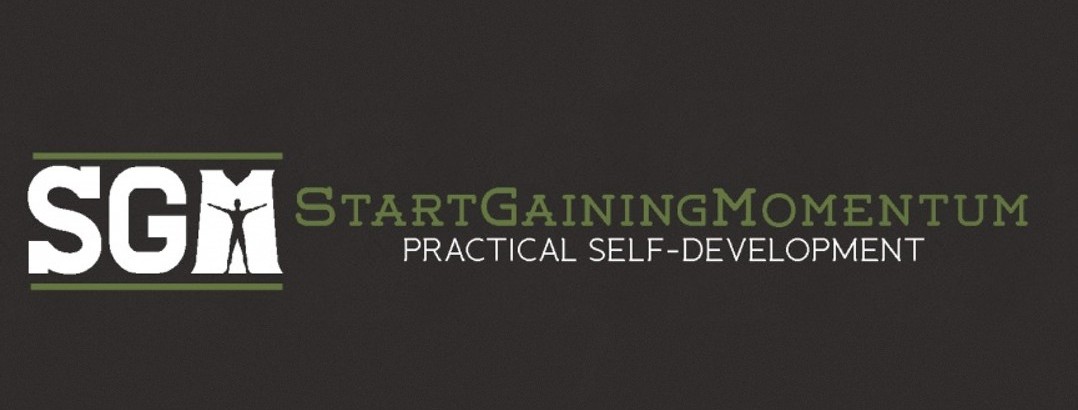Estimated Reading Time: 10 mn (2250 words)
StartGainingMomentum.com is one of these websites from which you bookmark 80% of the pages. After some emails Ludvig, (the author of the website) and I exchanged, I decided to lead an interview he kindly accepted. I had some questions about the website and his philosophy; and this is a great opportunity for him to elaborate.
Hi Ludvig,
you are the creator of StartGainingMomentum.com, a website for practical self-development. Before beginning, can you tell me more about what “practical self-development” means?

Hey Razique! The term “practical self-development” means any type of information that can be practically applied to improve your life, whether it’s a practical tip or some philosophical mindset. I guess this might be a vague definition, but I try to stay away from the normal woo-woo bullshit spouted in the realm of personal improvement.
In other words, there will be no tips on channeling your super sacred chakra energy crystal on my site.
Your website has a lot of interesting and cool stuff; for how long have you been working on it?
For about two years. The first year I just wrote for myself. I did it to keep myself accountable. The second year I realized I enjoyed blogging and put some thought and effort into getting a readership and studying the skill of blogging. I’ve incrementally made the site less about me, and more about helping the reader.
You seem to read a lot; and yet you seem yourself to advocate less reading towards more personal creativity. I find myself not reading that much; but trying to squeeze out everything I can out of my readings. What would be a good rhythm according to you?
Yeah, that might seem hypocritical. But I feel I am entitled to say such a thing because I’ve gone from reading nothing at all to reading around 60-80 books per year for nearly three years straight now. So I know both sides of it.
I think at some point you need to ask yourself: Why am I reading?
Your reading needs to be directed at a goal. In fact, it already is, but you might just not know the specifics of that goal because it’s on a subconscious level. If so, you need to figure out what that unconscious goal is: What are you trying to find out here?
The reason I’ve read these books is because I’ve felt I’ve had to know a lot of things to master different areas of my life. Now that I know most of the things I set out to learn, it becomes more about implementing, practicing, and mastering these things until I’ve embedded them into my philosophical framework and daily routine.
However, most people are nowhere near this limit. I would say that most people (90 % at least) should read more than they do. One hour per day minimum.
The answer to your question is this: It depends on how much you currently read. Unless you have dyslexia you should aim to read at least 10-20 books per year. When you aren’t in the habit of reading it’s challenging and “boring”, but once you do it every day for like a month, that amount is nothing.
A person who doesn’t read much –the average person – who then builds the habit of daily reading, will be blown away by how it changes his life.
Speaking of which, people seem to read less because of the sporadic ways we have to gather and collect Information, using the Internet. Do you think it’s simply a new paradigm about the way people educate themselves?
This is something I’ve given a lot of thought and I think it’s a question that is incredibly overlooked by most people.

To be brief: Yes, I think it’s a new paradigm. This is both positive and negative, though mostly negative. Let me tell you why.
- First, reading is more than just collecting information. When you’re reading you’re – hopefully – changing the very structure of your brain by learning. You’re – hopefully – thinking about how the information you take in meshes with what you already know, and considering its implications. I say hopefully, because most people don’t do this. You also need to take into account that the better you are at putting yourself into a state of high concentration that is conducive to learning, the more enjoyable it will be, the healthier it is for your brain, and the more efficiently you learn.
The way that most people read or collect information on their computer cannot be compared to the deliberate act of creating a structured routine of sitting down to read while taking notes and investing fully into the learning process without allowing for interruptions. Most people have their inboxes and social media accounts open in the browser, allowing for a stream of constant interruption. They are rarely ever in a peak state of learning while sitting by the computer.
- Second, it’s a positive thing only to a select few people – those who have a clearly formulated goal, a lot of willpower and well-honed ability to focus only on the essentials, are good at delaying gratification, and can decide in advance what they’ll do before sitting down by the computer.
However, these people are exceedingly few. Probably less than 1 out of 1000.
- Third, it’s a negative thing to most people because they get overwhelmed by all the information. This is a fundamental problem – a problem that will increase in magnitude over the years to come…
…There is only going to be more and more information and content put out on the Internet. Exponentially so in fact.
This is a great thing for those very few people in the first group I told you about. But for just about everyone else this is actually problematic. The reason I say this is because when there is more information it results in more choice. And the human brain can only handle so much new information and decision making at a time. Especially people who don’t live a lifestyle that is conducive to practicing the brain by improving concentration and decision making.
…And that is true for most people (99.99%).
In short, we’ll soon have all the information we need to do just about anything. The problem is that most people will be too mentally weak, too confused about what they want, and will lack the decision-making ability to ask the right questions, and get to work once they have got the answer.
As a market response to this, you will see an incredibly increase in “niche experts” over the coming 10+ years. These so-called niche experts will be the people who help organize the vast amounts of information related to their niche. They’ll ask and answer the relevant questions that lie dormant in the minds of the target group, and help guide them to their unspoken goals.
There’s a great book that is slightly related to this called “The Paradox of Choice”, by Barry Schwartz. More choice does not equal happiness – unless you are the sort of person who enjoys reflecting on things and making decisions.
Anyway, there are a bunch of other examples of how this “more-information-equals-more-choice-paradigm” plays out in the world…
… Take video games.
Most great video game franchises started out by attracting a small, but loyal, fan base as a result of having differentiated themselves from other games. This usually happens by having created unique gaming experiences as well as a range of options that didn’t exist in any other game. An example might be that you get to pick up any weapon you’d like from enemies you slay in an FPS game.
Eventually, as word of mouth spreads, the game gets popular. The company that produced it gets bought up by a larger company that wants to make money. So, the large company gives the order that the newest installment of the popular game is going to be adapted to the mainstream by limiting the range of choices you can make in it. In the sequel version, the player can no longer pick up any and every gun. By default he is given a set range of weapons before starting each mission.
Why?
Because the big corporations tend to want to make money, and they know that the average guy doesn’t like to make choices. The average guy wants to have the entire experience catered to him without having to do any thinking. As a result of this, the original fan base starts hating the video game, because the things that made it unique are now eliminated.
Point being, this is a universal principle based on how most people’s brains work. A few people like making choices and enjoy customization, while most people don’t like it at all, and indeed their brains can’t even cope with it. Apple understood this, and it’s one of the reasons why they are profitable.
Would you consider physical exercise and healthy diet (whatever that means) something related to self-development?
Yes. Mainly for two reasons:
- If you can’t get fit or eat healthy you lack discipline and willpower, and they are both imperative to all areas of self-development.
- If you’re not physically fit and eating healthy, you’ll have less energy to pursue your goals.
Are arts, such as poetry, music or even painting; something you consider as self-development?
I think it depends on the reason for why you do it. For the most part I would say yes, because it’s an excellent way of becoming more focused by practicing your brain’s prefrontal cortex in addition to becoming more creative.
A lot of artists are extremely smart and goal-oriented as a result of spending most of their days in a more-or-less constant state of flow. Rappers are particularly interesting, especially bragging-rap, because they are basically sitting around writing empowering affirmations about themselves all day long.
Can you tell me more about one of your typical days?
I haven’t had many typical days lately. My routine has been more or less changed every 1-2 weeks for the past few months as a result of dealing with a ton of stuff.
But regardless of circumstances I always do the following things each day:
- Meditation for 10-30 minutes to practice my concentration.
- Skip breakfast.
- Take ice cold showers.
- Read for an hour.
- Go to the gym and lift heavy weights, not each day. But 4 times a week.
Is your website something you manage on the side or is it your main “project”?
It has only been a side thing so far. But I would say it’s been a “big side thing”. And I am probably only going to be putting more time into it.
Any advice for the people willing to realize their dreams; yet they lack motivation; out of fear or lack of self-confidence maybe?
Sure. Think of it this way: your dreams will continue being just that – dreams – until you concretize it into a specific action that you can take each day. This will enable you to realize your goal incrementally. If you want to write a book, ask yourself:
How many pages should it be?
- 300 pages.
How much time do I have?
- 100 days.
That means you will finish your book by writing just 3 pages per day!
That’s no problem for you, is it? You can find the time to do that after work or after school, can’t you?
When you’ve done this you’ll have taught your brain the value of incremental work, laying that single brick each day until you eventually create a wall. This is actually how you build self-confidence, little by little.
So, in summary, here’s what you do:
1) Figure out what you want to do and how much time you have.
2) Concretize your goal by turning it into a specific number of tasks that can be done each day.
3) Do it until you’re finished.
It’s very simple. But most people don’t do it.
Another piece of advice – for overcoming fear – is the following:
1) List all the positive things and reasons for specifically why you should – no, why you need to – do something. Don’t stop until you’ve found a couple of emotionally powerful reasons for why this needs to be done.
2) List what will happen if you don’t do the thing, and how it will likely impact your life.
3) List the reasons why you are afraid of doing the thing, and why you are hesitant to taking action.
4) Logically decipher each of the points in step 3 one at a time as if carrying on a dialogue with yourself. If you’ve read Marcus Aurelius book “Meditations”, that’s how you do it. By doing this you will often come to the conclusion that your fears are unfounded in reality. Your fear is based on the fact that your brain jumps to conclusions that are inaccurate.
When you’ve done this, you’ll see that you likely have some very good reasons for doing the thing. You will probably find that the gains outweigh the losses. But, you’ll still be scared. Just less so.
You must still force yourself to start.
What are the next steps for your website? Will you have some exclusive content for “premium” members?
I am not decided on this yet. The thought has crossed my mind. We’ll see over 2014, I have some ideas in mind.
I don’t want to create a service or product unless I think it kicks ass, and it’s something I myself would want to buy.
![]() Thank you Ludvig for sharing your insights!
Thank you Ludvig for sharing your insights!
Here is a selection of 4 articles I have myself really enjoyed:
- Why You Should Compare Yourself to the Greatest Men in History
- The Reason why People are Fat, Tired, and Angry
- How to Keep a Digital Commonplace
- Should You Talk About Your Goals or Not?





Discussion2 Comments
Thanks for the interview, Razique!
Thank you for taking the time to answer my questions Ludvig.